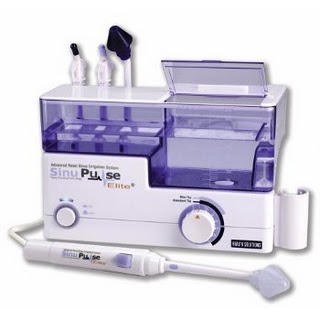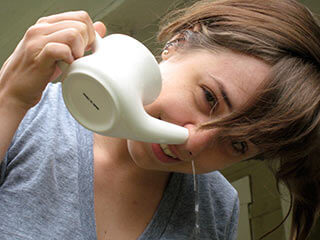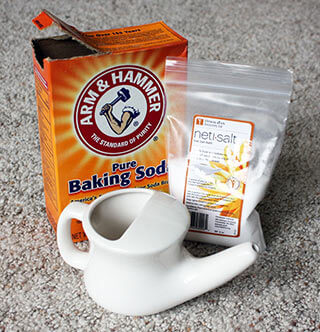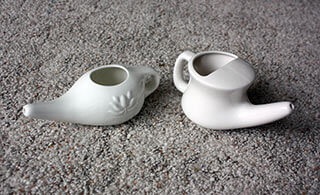Nasal Irrigation
All you need to know about nasal irrigation and how to do it
Nasal irrigation (also known as nasal washing, sinus rinsing, sinus lavage, and sinus irrigation) is a practice where the nasal cavity is flushed out and cleaned with a warm solution of salt water and sodium bicarbonate. It is usually performed using a device called a neti pot but there are several other nasal irrigator systems on the market now. It has been noted that ancient yoga practitioners performed a nasal irrigation technique known as jala neti and now many people from around the world do it for its cleansing benefits. In this article we will go into detail about the benefits of nasal irrigation, the possible side-effects, and how and when to do it.
Benefits
Airborne allergens (dust and pollen), dirt, pollutants, and bacteria are collected in our nasal cavities as we breathe. The body tries to protect itself from these particles by creating mucus which traps a lot of these particles as they travel through the nasal cavity. Too much build-up of the particles in the nasal cavity causes problems such as excess mucus, inflammation, and even infection. Nasal irrigation performed daily helps remove these contaminants to allow the nasal cavity and sinuses to work efficiently and effectively.
Here is a list of benefits from nasal irrigation:
Freshens breath - Alleviates symptoms of post-nasal drip which is known to cause halitosis (bad breath).
Alleviates nasal congestion - Nasal irrigation thins the mucus in a congested nose making it easier to expel and also remove contaminants that may have caused the congestion in the first place. Also by relieving nasal blockage it allows one to breathe easier.
Flushes out allergens, pollutants, and bacteria - These are not good for the body and helps prevent against sickness and infection. Also helps allergies.
Helps the cilia - The tiny cilia or hairs in the nasal passage are able to transport mucus more efficiently.
Improves sense of smell/taste - Cleaning out the nasal cavity allows the sensory cells to perform effectively.
Side-effects
Multiple studies have been carried out about nasal irrigation. Most of them comment on the benefits the test subjects receive from nasal irrigation and few report negative side-effects from it. However there are reports of some negative effects.
Some people report nose-bleeds that are caused by nasal irrigation. In a study in 2009 it was reported that frequent nasal irrigation led to higher rates of sinus infections, which was likely caused by a lack of the protective mucus layer that was being flushed out constantly through nasal irrigation.
Although there have been reports of side-effects, a lot of these side effects and negative experiences from nasal irrigation arise from improper usage of nasal irrigation, such as not using a proper solution or irrigating the nasal cavity too often. For example if one was to use a solution that contained too much salt it would dry out the nasal passages and may cause nose-bleeds or irritation.
BreathMD's Advice: Try nasal irrigation out. Only do it once per day and use the proper solution. If you do not like the effects it has on you, then stop it. If you are suffering from acute sinusitis or if you have frequent nosebleeds, it would be wise to consult a doctor about nasal irrigation before trying it out.
Solutions used for nasal irrigation
The membranes in the nose and sinuses are very sensitive. The cells in these membranes have a specific level of salt concentration, pH level (measure of the acidity or alkalinity of a fluid), and temperature. In creating a solution to use in nasal irrigation it is important to use an isotonic solution (has the same salt concentration) that has the same pH level and is as close to the body temperature of 98°F / 37°C as possible.
Using a solution that does not match these levels causes irritation in the membranes and sends "pain" messages to the brain. A lot of people think nasal irrigation would be uncomfortable, but this is mainly due to the fact that people associate snorting water with pain. This association comes from when people have accidentally gotten tap or chlorinated water in their nassal passages that does not match the levels of the cell membrane we talked about and irritation and pain ensues. When you snort a solution that is at the correct levels you will find that it is not uncomfortable and may actually be pleasant.
Salt: Make sure the salt is as pure as possible, non-iodized, and that it contains no additives such as anti-caking agents. Kosher, pickling, and canning salt are pure and acceptable to use. Sea-salt, even if it contains no additives, is often discouraged due to the fact that it may contain algae, but that is debatable. Table salt contain additives so do not use it. The salt by Himalayan Institute is perfect to use as it was made especially for nasal irrigation.
Water: Pure water is ideal. Use bottled or filtered water. Do not use tap water as it often contains chlorine, mercury, nitrates, fluoride, and may even contain some carcinogens such as chromium-6. These chemicals can irritate your sinues and cause problems. Use filtered, bottled, distilled, or mineral water instead. The water you use should be warm (ideally 98°F) to maximise the effectiveness and to minimize irritation. If your water is room temperature or colder you can use an immersion heater to heat it up before use. It usually takes a little over a minute (depeneding on the quantity) to reach 98°F.
Baking Soda: This is an optional buffering agent to increase the pH level of the solution. Make sure it is pure sodium bicarbonate. Baking Powder is not acceptable.
The Proper Proportions
The Normal Saline (NS) solution that is referred to as physiological saline or isotonic saline is 0.90% w/v (mass/volume) of sodium chloride (salt). This translates to 9 grams of salt to 1 liter of water or 2.13 grams to 1 cup. Salt granules come in different sizes so it is important to know how much of the salt you use is 9 grams. For example, a teaspoon of extra fine salt will weigh more than a teaspoon of coarse salt.
GENERAL RULE: Using fine salt, a heaping 1/4 teaspoon is needed for every cup of water. 1 and 1/4 heaping teaspoons of salt are needed for every liter of water.
Salt absorbs moisture so the higher concentration of salt you use the more it will relieve swelling, and the lower concentration of salt the more water that the tissues will absorb. Generally if you are suffering from a congested nose you may try a hypertonic solution (higher salt concentration) in order to relieve swelling.
If you add baking soda to your solution the general accepted amount is equal to the amount of salt you added. So if you add 1 teaspoon of salt, then add 1 teaspoon of baking soda.
Using these porportions, you will create an effective nasal saline solution
Methods
There are many different ways to irrigate your nasal passages, some work better than others. Try various methods and see which one you like most.
NOTE: Remember, whatever method you use, to regularly clean the tools you use and rinse them out before and after use. For example rinse your neti pot out before using it, or wash your hands before snorting the solution from your hands.
Snort solution from cupped hands - This is the cheapest and simplest way to nasal irrigate. Basically you pour the nasal solution into one of your cupped hands and snort it through one nostril while plugging the other. After you snort the solution and have it in your nasal cavity I like to do what I call a nasal gargle with the solution. Basically you just breath through that nostril slowly and it agitates the water just like when you gargle water in the back of the throat. After doing that expell the solution from your nose by blowing your nose while still having the other nostril plugged. Switch and do the same thing through the other nostril and do this as many times as needed.
Neti Pot - Nasal irrigating with a neti pot is the most common way to nasal irrigate. Below are the steps to take on how to irrigate your nasal passages with a neti pot.
Fill the neti pot with the warm solution.
Insert the spout into one of your nostrils.
Bend over a sink with your head face down and tilted to the side so the neti pot is up in the air. The neti pot uses gravity to create positive pressure of the solution in your nose.
If you are bent over properly and if you are not too congested the water should soon fill the nasal passage and begin to come out through your bottom nostril. While doing this have your mouth open and breathe through it. Let the water run through until you estimate that half of the water has been used.
Plug the nostril that the spout was in and blow the water out from the other nostril.
Repeat with other nostril.
We like the neti pot by Ancient Secrets
the best.
Bulb Syringe - Nasal Irrigating with a bulb syringe is carried out essentially in the same manner explained using a neti pot, except instead of gravity, pressure applied to the bulb by the hand creates the positive solution pressure. Although you may control the pressure easier with the bulb syringe while irrigating, it is often more difficult to clean and care must be taken to properly clean the bulb syringe regularly to prevent bacteria and mold from growing inside it.
Nasal Sprays - Nasal sprays are bottles with a nozzle that you place in each nostril. You squeeze the bottle and it creates a mist that moistens the nasal passages. While it doesn't do as thorough of a job as other nasal irrigating methods it is more portable and easier to use for small children and babies. Some good nasal sprays are Simply Saline Adult Nasal Mist
and NeilMed Sinus Rinse
.

Nasal Irrigation Machines - There are several machines on the market now that are motorized and pump the solution through a tube. Many have adjustable pressure and some feature a pulsatile or pulsating water pumping action of a low rate that is designed to match the normal wave rate of nasal cilia that are healthy. There are many other machines such as the Sanvic Pulsatle Nasal/Sinus Irrigator, Grossan Hydro Pulse System
, Nasaline, SinuPulse
, and others. There are tips that you may attach to a Waterpik
that make it so you can irrigate with that and also use it as an excellent flosser. When buying a system make sure to read the reviews and do some research so that you have a quality irrigator that meets your specific needs.
When and How Often
How Often - While nasal irrigation is important and beneficial for overall nasal health, doing it too much can have negative effects. When you nasal irrigate you flush out the protective mucus layer that lines your nasal passages. It is recommended that one irrigates only once or twice daily. Doing it more than that can cause dryness and irritation in the nasal passages.
When - Some people like doing it before bed, in the morning, or both. Try different times and see what you like most and what gives you the best results.








Ms
Contracted bade eye infection over nite. Five,eye swollen close. Emergency eye surgery. All the infection where? To the other side of my face. Eye dr says no connection. Go to my PCP, he says it when to other side n sinus infection. Haven't slept peace n with out pain sine April. Dental surgery. Same problem put on steroids. Stopped again for 5 days n then excruciating pain on left side. Pvp, more steroids. Looked up Dr. Drew n saw the neti pot. Tried last nite. Slept all nite. Please try. Takes 5 mins. Did again tonite before bedtime...NO PROBLEM!!!
I must not have waited long enough before going to bed after using neti pot. Woke up violently ill. Worst, salty vomit I've ever experienced. Used it three days before in the afternoon/ early evening, no problem. Used boiled, cooled water, with packet in measured amount of water. So, everything as instructed except went to bed less than hour after the rinse. Never again, that was brutal.
Just a correction: the NeilMed Sinus Rinse is a rinse like the others, not a spray.
I use it and credit it with reducing the frequency of my sinus infection/chest colds ever since.
I use a 10ml syringe.(no needle!) It is cheap,no mess, full control, comfortable. Fill small bowl(I use distilled and sea salt), draw up,place to nostil gently push plunger. I usually do a couple of shots each nostril
I started flushing my nose, both sides-to try and get rid of the PND.. I went to a ENT Doctor who told me to stop snorting. da.a health food person suggested I try oregano oil mixed with water... hope this and my nose flushing gets a grip on my PND... any help out there. Ellery
I am very eager to try a neti pot. I have always just stuck my head into my hands full of hot water, inhaled through my nose and then blew it out. now i can neti. yes!
use distilled water, I have read tap water is NOT good. Buying the pre-measured packs (not expensive) is the way to go. I bought the squeeze bottle instead of neti pot. I have always been afraid to do this, but recently tried it and cannot believe how great this works. Try it!
Frequent severe nose bleeds while sleeping during these treatments using proper water and premixed ingredient packets! Was done twice a day as recommended by specialist.
Any suggestions????
@ Britney, I know this is an old reply but the two people that died were in Louisiana (hello hurricanes?). Those people should have known better and boil that dirty water.
Daily sinus headache during allergy season if I don't rinse. Chronic post nasal drip with constant swallowing is alleviated by rinsing. I use the Neil Med sinus rinse bulb. Excellent product, near miracle.
My recipe
Use 1 c distilled water, 1/4 tsp baking soda, 1 tsp salt, AND 1-1&1/2 tbs white vinegar. The vinegar will kill the Pseudomonas bacteria which can kill you. 10 surgeries., chronic sinusitis for about 40 years, and one case of Pseudomonas. Been there, done that.
I bought the sinupulse and it is really helping. Best sinus investment I ever made!
my boyfriend and i both neti. we both suffer from severe sinus problems. while we both have occassional slight nose bleeding, irrigating is part of our daily life. always use bottled or sterile water or do not do. you can buy a neti pot with 50 saline packs for 13$. worth every penny!
Vicks vapor rub in cherry scent is good if you don't like the smell of regular Vicks vapor rub... Gotta love winter time!!
Do not use affrin nose spray it will make nasal congestion, worse!! It makes you worse :(
Help please
I have had chronic sinus problems most of my life.. Is there surgery for sinuses I need to get it done, and non stop migraines always stopped up nose sucks.... Any recommendations? Thanks
2 people have died from using tap water so please use distilled water or water that has been boiled till sterile.
My sinuses have been so much better ever since I started irrigating them. I bought the SinuPulse machine and I love it!